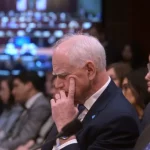The United Nations may resort to military action against states that defy its mandates on global climate action, according to Ole Wæver, a prominent international relations professor at the University of Copenhagen.
In an interview with ABC News in Australia, Professor Wæver cautions that what he sees as “climate inaction” might draw the U.N. into considering other means to ensure its goals are met, even if that leads to global armed conflict.
Professor Wæver says more resistance to change could potentially threaten democracy although the U.N. would counter that the end justified the means in much the same way countries like Greece had their debt crisis solutions forced on them by European Union bureaucrats in Brussels and Strasbourg.
“The United Nations Security Council could, in principle, tomorrow decide that climate change is a threat to international peace and security,” he says.
Macron vows nuclear arsenal boost as Europe turns to nukes amid rising global threats
‘Under siege’: Inside the growing radical Islam threat critics say is hiding in plain sight in deep red Texas
Walz-Ellison administration ‘enabled’ Minnesota’s fraud scandal: Guy Benson
NYC Dept of Education employee arrested, charged with murder of Bronx father
Savannah Guthrie returns to ‘Today’ show studio for first time since mother went missing
Iran widens regional war with first strike into Azerbaijan
5 House Oversight Committee Republicans Join with Democrats to Subpoena Pam Bondi in Epstein Probe
As Jasmine Crockett Concedes Texas Senate Primary, Attention Focuses on Radical Dem Who Beat Her
Tom Emmer calls for Tim Walz, Keith Ellison to ‘serve jail time’ if fraud coverup allegations are true
Republican Rep Burgess Owens to retire from Congress when term ends
VIDEO: College Basketball Ref Knocked Out Cold When Players Turn Violent on Court
DOJ Ends Investigation Into Autopen Scandal With Zero Charges, Grand Juries, or Indictments
The ‘woo-woo’ philosophy of Trump’s surgeon general pick
Illegal’s dragging of ICE agent shows the exact danger the officer who shot Renee Good feared, expert says
The Iran Strikes Have Flooded X with So Much AI Disinformation That I Went Crawling Back to Cable News
“And then it’s within their competencies to decide ‘and you are doing this, you are doing this, you are doing this, this is how we deal with it’.”
He believes classifying climate change as a security issue could leave the door open to more extreme policy responses.
“That’s what happens when something becomes a security issue, it gets the urgency, the intensity, the priority, which is helpful sometimes, but it also lets the dark forces loose in the sense that it can justify problematic means,” he says.
This urgency, he says, could lead to more abrupt – and essentially undemocratic – action at an international level.
“If there was something that was decided internationally by some more centralised procedure and every country was told ‘this is your emission target, it’s not negotiable, we can actually take military measures if you don’t fulfil it’, then you would basically have to get that down the throat of your population, whether they like it or not,” he says.
“A bit like what we saw in southern Europe with countries like Greece and the debt crisis and so on. There were decisions that were made for them and then they just had to have a more or less technocratic government and get it through.”
Professor Wæver made his predictions last month on the eve of the United Nations COP25 climate conference now underway in Madrid, Spain.
Almost 25,000 delegates and 1500 journalists have flown into the Spanish capital to attend the two-week long meeting.
COP25 will consider a wide agenda of global action including implementing taxes on developed countries to transfer wealth to nations dealing with “the cost of drought, floods and superstorms made worse by rising temperatures,” as Breitbart News report.
Macron vows nuclear arsenal boost as Europe turns to nukes amid rising global threats
‘Under siege’: Inside the growing radical Islam threat critics say is hiding in plain sight in deep red Texas
Walz-Ellison administration ‘enabled’ Minnesota’s fraud scandal: Guy Benson
NYC Dept of Education employee arrested, charged with murder of Bronx father
Savannah Guthrie returns to ‘Today’ show studio for first time since mother went missing
Iran widens regional war with first strike into Azerbaijan
5 House Oversight Committee Republicans Join with Democrats to Subpoena Pam Bondi in Epstein Probe
As Jasmine Crockett Concedes Texas Senate Primary, Attention Focuses on Radical Dem Who Beat Her
Tom Emmer calls for Tim Walz, Keith Ellison to ‘serve jail time’ if fraud coverup allegations are true
Republican Rep Burgess Owens to retire from Congress when term ends
VIDEO: College Basketball Ref Knocked Out Cold When Players Turn Violent on Court
DOJ Ends Investigation Into Autopen Scandal With Zero Charges, Grand Juries, or Indictments
The ‘woo-woo’ philosophy of Trump’s surgeon general pick
Illegal’s dragging of ICE agent shows the exact danger the officer who shot Renee Good feared, expert says
The Iran Strikes Have Flooded X with So Much AI Disinformation That I Went Crawling Back to Cable News
President Donald Trump officially withdrew the U.S. from the Paris Climate Accord, which COP25 is a continuation thereof, in October as part of an election promise to voters, saying he was “elected to represent the citizens of Pittsburgh, not Paris.”
Story cited here.
























